

Good conversation is really writing development. Sometimes I see parents who kind of shush their kids or get obviously bored when their kids are telling them a rather long drawn-out story (like retelling a movie plot). But retelling a tv or movie plot or telling everything that happened, in order, in a video game are really great for writing. In fact, all that verbal stuff—conversation, summarizing movies, persuading or arguing, playing games, etc.—is MUCH better for developing good writing than practicing writing in the artificial ways that schools do it.
—pam
If you're comparing to things you see coming out of schooled kids, that's not fair because they're generally following a format or template provided by the teacher. And they're writing drafts, getting comments and suggestions by a teacher, and rewriting. And HATING every minute of it. And it is all mostly a big huge waste of time because the kids are learning that WRITING IS HARD and MISERABLE and nobody in their right mind would do it unless it was forced on them. THAT is the big lesson learned and, as Frank Smith says, when something is really learned, it is very very difficult to ever unlearn it.
—Pam Sorooshian
UPDATE, September 2012, from Chris, Zach's mom:
Here's an update on Zach and his writing: He's a senior at the University of Iowa (History Major) and he has a 4.0 GPA. He was appointed as a Writing Fellow and will be paid by the University to help undergraduates with their writing skills. Zach did not receive any formal writing instruction until he started college.Also, recently he granted me permission to share this paper that he wrote in January 2010 for his Composition II class about Jon Spayde's essay "What Does it Mean to be Educated."
My daughter also has done a lot of writing before she could read well. Even though she can read virtually anything right now, she tends to write more than she reads. She also likes practicing her handwriting and is working on "cursive" right now—totally self-directed. Her writing is pretty evenly divided between composing at the computer and on paper.
In addition to writing stories and songs, one thing she's been liking recently is to make lists of names, including at least one for each letter of the alphabet. Ideally, she wants names that won't trigger the underlining function that MS Word does when it doesn't recognize a spelling. So she's looking for classic, traditional names, many of which she hasn't heard of much before herself.
Recently, I found her a names site with all the variations on different names and some of their histories. It was from Googling, which she's undoubtedly seen me do a lot. Then, she sat down and copied all the names she liked, sometimes asking me how to pronounce a name. (It's also interesting to me that some of her favorite names are Agnes and Agatha—an insight into the cyclical nature of names and that different sounds seem new and appealing to different generations.) One thing she does with these lists of names is names her Polly Pockets with them, but that doesn't seem to be the sole reason she does it—she finds pleasure in making her lists.
Later that day, I saw her at the computer and she was Googling things she was curious about without me. That seems to really fit her learning style right now. She watches and copies. I have other children who do like talking about and having me involved when they try different things. She tends to watch and then do.
She's also told me recently how it's sort of odd for her to be able to read because once you know how to read you can't *not* read all the words that are always in front of you. (She turns 9 in July, BTW.)
Kathleen
in SoCal
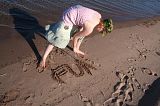
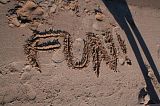
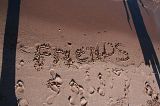
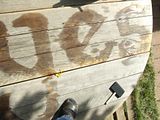
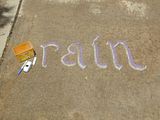
Cameron left school at 12. He swore to me he would never read or write again.The first year, he spent a lot of time on the computer IMing mostly. (I didn't remind him that *was* writing and reading!
)
He avoided both as best he could. And did a pretty good job of that as I remember!

He started reading a bit these last couple of years—mostly books on dead rock & rollers!
He has a HUGE book on Phish, and we've bought him numerous books on Jimi Hendrix, The Dead, The Beatles, The Stones, Cream, etc. He's devoured them all. He gets magazines on drumming (Relix & Modern Drummer)—cover to cover! He took Wherever You Go, There You Are with him to read on the plane. For years, writing seemed to be limited to thank you notes and occasional journaling, which he NEVER thought he'd enjoy!. He bought a new journal for his trip to Scotland this week. And he and his girlfriend share a journal and write back and forth to each other in it. I don't know how many journals he's gone through lately!

He just got back from Not Back to School Camp in West Virginia. He's totally devoted to writing letters to his new friends—long, art-filled letters with deep thoughts and life questions. It's so neat to see him into letter writing! He eagerly awaits the postman (and is disappointed when there's nothing for him!) and spend hours writing letters and doing little bits of art in the margins and on the envelopes.
School damaged him—but not beyond repair! He HAS unlearned it. But I believe that is only because I (and his dad and he!) so totally understand how unschooling—and LEARNING!—works. And we trust that he'll learn everything he needs to know when he's ready.
~Kelly
My 7 yo daughter has rarely had a writing implement out of her hand since she picked one up at age two. We've gone through at least two cartons of blank paper for her drawings and writings. Her handwriting is still lousy, but not for want of practice at small motor skills or whatever. She spent 2 months in school and it improved then but slipped back after she left because right now it isn't an important part of writing for her. When she writes, the point is to get the thoughts in her head down on paper. (And don't get the idea she's writing Moby Dick ;-) They are very simple stories, notes, signs, sometimes just a label on a picture.) When she is writing, forming the letters in a standard way just interferes with that process. Writing "properly" is more like art and at the moment, she's more interested in other things. When she's interested in writing so others can read, or in more artistic handwriting, then she will do so. *My* part in the process is to provide opportunities for her to take up when she's ready. I make sure she knows the books on Italic handwriting are there for her, pull out the calligraphy books every once in a while, pull out the Magnadoodle and form letters with her occasionally (this is a *game*, I don't make her do it if she'd rather do something else). I did write out a bunch of fun personal words and names, one or more for each letter of the alphabet. Maybe I should have them laminated so she can play around with them and trace over them. She'll write well when she's ready as long as she has access to materials to help her, a helpful mom and she knows the process will be intriging and the skill useful or pleasing to her.If you want to read that paragraph in context with the rest of Joyce's response to someone's "yeah-but-what-about" question, it's here, and it has an update a sample of her 14-yr-old writing (handwriting and content too).—Joyce
Dragon Writing Prompts
I have a son that will be 14 and doesn't like to write. How does this work in unschooling? We read lots of books on all kinds of subjects, but I am worried about his writing skills. Thanks for your input.Does he need to write right now to be better at being the 14 yo he is?
Does he write anything? Notes? Emails? Texts? Posts? Letters? If so, that's writing.
Does he talk? Does he ever explain or describe anything out loud? Writing is just talking with written words.
The reason writing is so hard in school is that kids are being made to write when they have nothing to say. They're writing about things they don't care about. (Book reports of books they were made to read. "My summer vacation.") They're writing to an "audience" who isn't voluntarily reading. Communication is moving the ideas in your head into someone else's head. How annoying to cobble together ideas you don't care about to put into someone else's head who doesn't care to have them!
What I'm doing here in this email is real writing. I'm writing about things I care about (unschooling and writing and how and why people learn). I'm writing to an audience (you and anyone else who reads this) who wants to know more about the subjects. If I'm unclear, someone will ask a question. If I clarify something that someone didn't understand before, they might give me feedback that it helped.
Writing *well* (as a published author does), like drawing well, like cooking well, like skiing well takes years of doing. But writing—eg putting thoughts into written words for someone who wants the information—is little different than speaking.
That's how any learning works with unschooling. 🙂
Joyce
Holly Dodd posted this on MySpace in her "About Me." This is not at all formal writing, but it's a candid look at everyday use of writing of someone not "taught writing." Not having been taught doesn't equal never having had the desire and opportunity to ask for advice and clarification, but mostly she's learned to write by writing back and forth with friends on the internet. The example below is from December 2007 and she was lately sixteen.
Hll Lnn Ddd. I'm still deciding how to start this... I shower a lot. I dye my hair, but it's not because I don't love it. Which I do, love my hair. I've never been enrolled in school, and that's always been okay. I've lived in Albuquerque my whole 16 years of life, and I definitely dig it. I guess I kind of have two best friends. One's a little more legit, though. I love myspace but I probably love my hair more. I think Across the Universe is the greatest movie made lately. (and I think we've got some pretty good ones these days.) I will sing to you. All you have to do is ask. And sometimes you don't even have to do that. I like things pink and pink things, but not exactly for the color. I'm pretty sure I like the bands Queen and Say Anything in the same way. But in a good way. I question a lot of things in the world and in my life, but I do not question Family Guy. This is my second MySpace account. I wish my FriendID didn't start with a 1. I have a lot of plastic barbed wire. I believe the best kind of macaroni is macaroni with cheese. I hardly ever notice peoples eyes. And I guess the only Fruit Stripe gum I don't like is the blue one with the pink wrapper. I'm pretty international, and I think it's neat. A lot of people I know aren't local but I know a ton of local people too. I pierced my own ear with a sewing needle. I don't particularly like my toes... like, at all. It's hard for me to think of Jude and Jim Sturgess as the same person. I used to hate my own handwriting but the more I write the less I hate it. Aside from anything on MySpace- most of what I write is notes and quotes. I own a lot hats and clothing that I don't wear. But it's nice, because people can come to me if they need an exotic outfit or awkward hat. Not lately, but I used to hate three people. Now though, I'm casual friends with one, pity the other one, and sincerely don't care about the third. I tend to sleep late. Like, late. I try not to go or be where I can't have fun. I think I was in some kind of denial about growing up until about March this year. Now I like it fine. In general- I live a fairly drama-free life.

Unschooled Kids' First Formal Writing
English, oddities and mysteries
Title and (former) background by Holly Dodd
Outside links: The Blue Book of Grammar,
If you have grammar or usage questions you can use Google to find answers. Put in the words or phrase and also "usage."